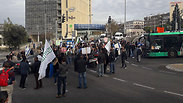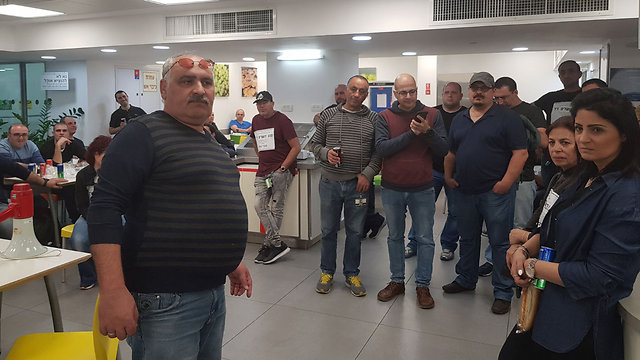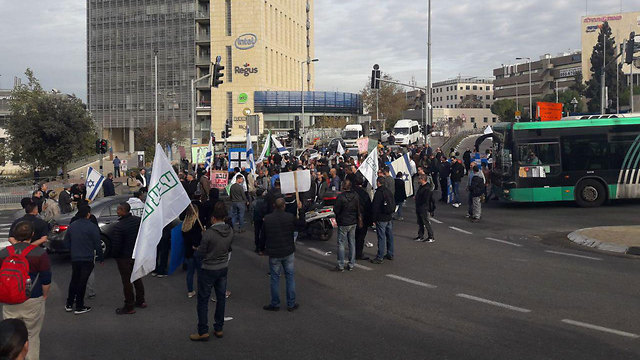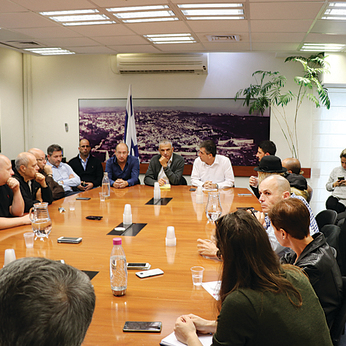

PM, ministers to meet Teva CEO on Jerusalem layoffs
PM Netanyahu, members of a special ministerial committee to convene with Teva CEO Schultz to decide company's future in Israel; sources say Israeli officials to underline special status of Israeli employees, especially in Jerusalem, ask layoffs to be directed at overseas factories; 2,000 Teva employees protest outside meeting.
Prime Minister Benjamin Netanyahu is expected to meet Teva CEO Kåre Schultz Tuesday afternoon in Jerusalem's Government Quarter and exhort the executive to close overseas production lines instead, in the wake of a massive plan to lay off a quarter of its workforce, including thousands of Israeli employees.
The prime minister will ask Schultz for Teva to close production lines in Ireland, Lithuania and the United States over the Jerusalem ones, with focus on factories in the capital stemming from the fact Teva intended to close them altogether, rather than downsize them.
A further request Netanyahu will make of Schultz will be to decrease the number of employees laid off in other factories in Israel. Netanyahu's concern for other countries notwithstanding, he is expected to convey to Schultz Teva's Israeli employees expected—and should receive—preferential treatment.

Netanyahu said state grants Israel can theoretically provide Teva with to allow it to continue operating in the country were not an option, since they would require legislative amendments, as current law stipulates grants may only be given for the creation of a new factory, something Teva cannot do in its current state.
The prime minister consolidated the aforementioned demands with members of a special ministerial committee, created to tackle the crisis that erupted at the pharmaceutical giant. Netanyahu met with the committee's members—Finance Minister Moshe Kahlon, Labor and Welfare Haim Katz, Minister of Jerusalem Affairs Ze'ev Elkin and Economy Minister Eli Cohen—Monday to coordinate positions in anticipation of their meeting with Schultz.

One of the committee's members remarked anonymously Monday that Israel should be mindful of not coming off as "Israeli chutzpah" in "telling the CEO of a non-governmental company what to do."
The meeting between Schultz and the senior Israeli officials is expected to determine the future of the company and its activities in Israel. Teva's Danish CEO is expected to give the government officials his word to keep the company's center and management in Israel for the next few years. He may also consent to let Netanyahu and the ministers walk away with a tangible achievement in agreeing to reduce the number of firings by 200 employees.
"It's a meeting for all the marbles," one of the meeting's participants told Yedioth Ahronoth.
Teva factories nationwide have declared a strike for Tuesday, while some 2,000 employees demonstrated in the capital's Government Quarter in the afternoon, simultaneous to Netanyahu and the ministers' meeting with Schultz.
Teva's employees did not wait until the meeting to make their intentions clear, however, blocking the entrance to the Har Hotzvim industrial zone earlier Tuesday, causing massive traffic jams in the area.
Employees chanted, "We're fighting for our home. What transpired in Amona will not happen again. We're ready to defend the factory with our lives."
The company's employees have been barricading themselves in the capital's two plants for the past two days, claiming that until they see an official signed letter decreeing Teva will stay in Jerusalem, they will not stop and even escalate their protest.
Itzik Ben Simon, chairman of the Teva tablet factory's workers' union, told his cohorts Tuesday morning, "Today is critical for us, it's the money time. After the prime minister and Teva CEO's announcement all of our plans may change."
Another meeting on the matter took place Monday with Kulanu ministers Kahlon and Cohen, who met in Jerusalem's Ministry of Finance with Histadrut Labor Federation chairman Avi Nissankorn and representatives of Teva's workers' unions. Kahlon gave them his commitment "the government will use all tools at its disposal to reduce the number of layoffs."
Gad Lior, Itamar Eichner, Telem Yahav, Yishai Porat and Adi Rozenberg contributed to this report.

















